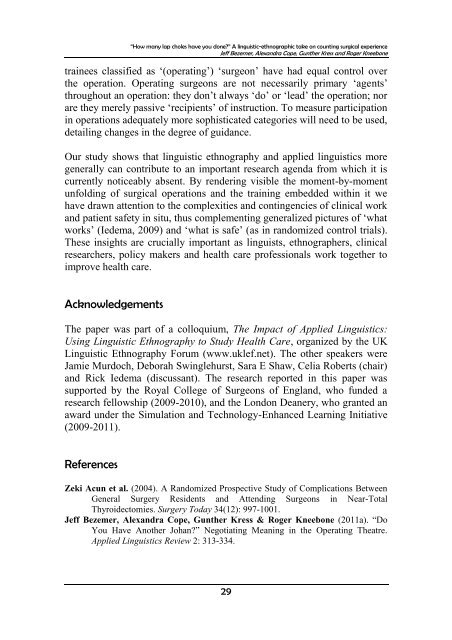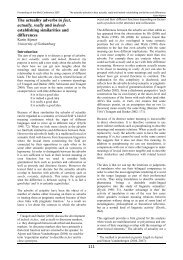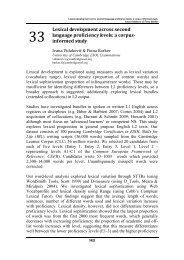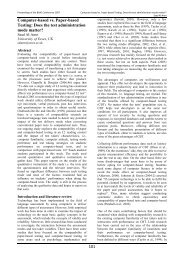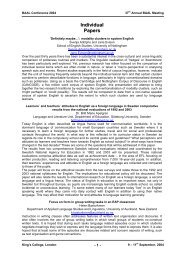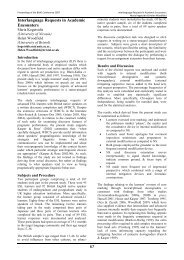Proceedings of the - British Association for Applied Linguistics
Proceedings of the - British Association for Applied Linguistics
Proceedings of the - British Association for Applied Linguistics
Create successful ePaper yourself
Turn your PDF publications into a flip-book with our unique Google optimized e-Paper software.
“How many lap choles have you done?” A linguistic-ethnographic take on counting surgical experience<br />
Jeff Bezemer, Alexandra Cope, Gun<strong>the</strong>r Kress and Roger Kneebone<br />
trainees classified as ‘(operating’) ‘surgeon’ have had equal control over<br />
<strong>the</strong> operation. Operating surgeons are not necessarily primary ‘agents’<br />
throughout an operation: <strong>the</strong>y don’t always ‘do’ or ‘lead’ <strong>the</strong> operation; nor<br />
are <strong>the</strong>y merely passive ‘recipients’ <strong>of</strong> instruction. To measure participation<br />
in operations adequately more sophisticated categories will need to be used,<br />
detailing changes in <strong>the</strong> degree <strong>of</strong> guidance.<br />
Our study shows that linguistic ethnography and applied linguistics more<br />
generally can contribute to an important research agenda from which it is<br />
currently noticeably absent. By rendering visible <strong>the</strong> moment-by-moment<br />
unfolding <strong>of</strong> surgical operations and <strong>the</strong> training embedded within it we<br />
have drawn attention to <strong>the</strong> complexities and contingencies <strong>of</strong> clinical work<br />
and patient safety in situ, thus complementing generalized pictures <strong>of</strong> ‘what<br />
works’ (Iedema, 2009) and ‘what is safe’ (as in randomized control trials).<br />
These insights are crucially important as linguists, ethnographers, clinical<br />
researchers, policy makers and health care pr<strong>of</strong>essionals work toge<strong>the</strong>r to<br />
improve health care.<br />
Acknowledgements<br />
The paper was part <strong>of</strong> a colloquium, The Impact <strong>of</strong> <strong>Applied</strong> <strong>Linguistics</strong>:<br />
Using Linguistic Ethnography to Study Health Care, organized by <strong>the</strong> UK<br />
Linguistic Ethnography Forum (www.uklef.net). The o<strong>the</strong>r speakers were<br />
Jamie Murdoch, Deborah Swinglehurst, Sara E Shaw, Celia Roberts (chair)<br />
and Rick Iedema (discussant). The research reported in this paper was<br />
supported by <strong>the</strong> Royal College <strong>of</strong> Surgeons <strong>of</strong> England, who funded a<br />
research fellowship (2009-2010), and <strong>the</strong> London Deanery, who granted an<br />
award under <strong>the</strong> Simulation and Technology-Enhanced Learning Initiative<br />
(2009-2011).<br />
References<br />
Zeki Acun et al. (2004). A Randomized Prospective Study <strong>of</strong> Complications Between<br />
General Surgery Residents and Attending Surgeons in Near-Total<br />
Thyroidectomies. Surgery Today 34(12): 997-1001.<br />
Jeff Bezemer, Alexandra Cope, Gun<strong>the</strong>r Kress & Roger Kneebone (2011a). “Do<br />
You Have Ano<strong>the</strong>r Johan?” Negotiating Meaning in <strong>the</strong> Operating Theatre.<br />
<strong>Applied</strong> <strong>Linguistics</strong> Review 2: 313-334.<br />
29


